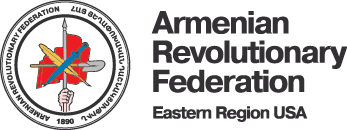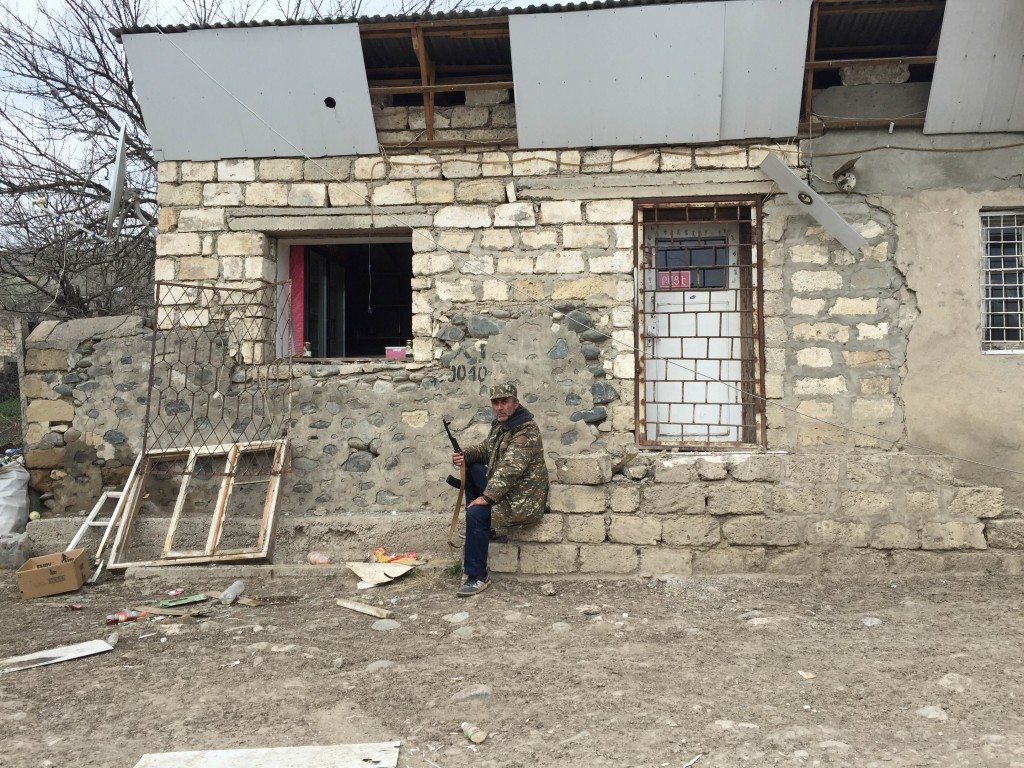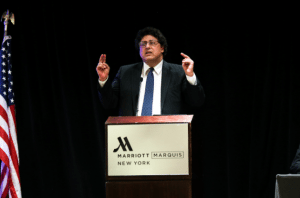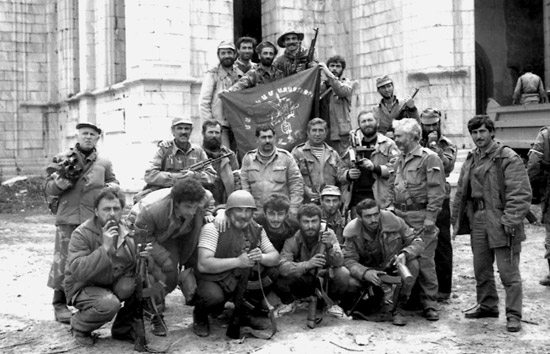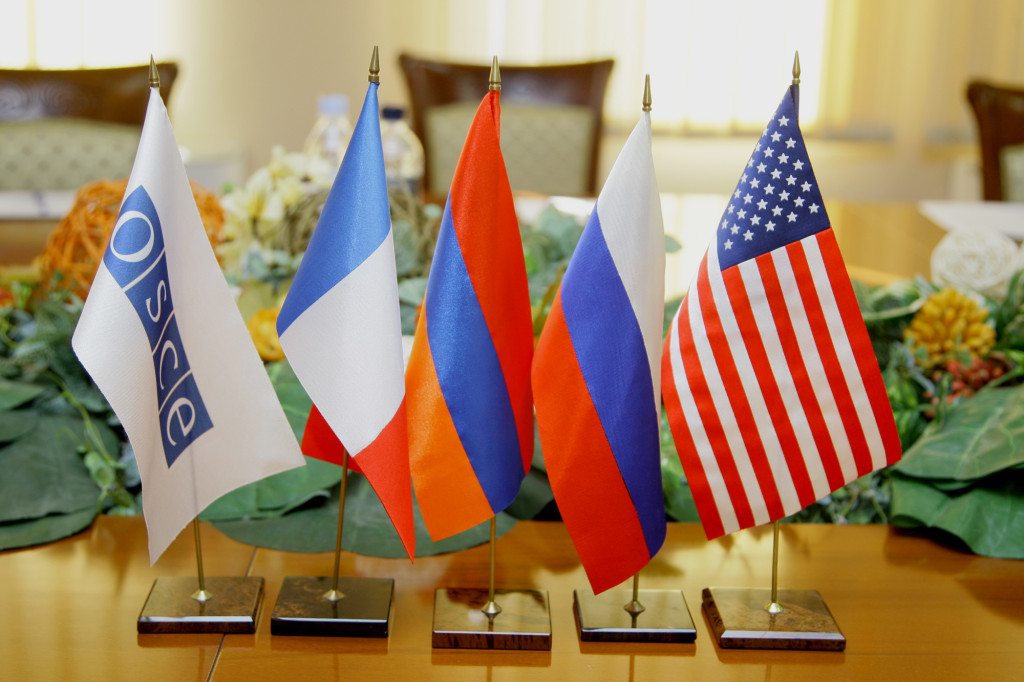A Fighting Spirit and Mind: The Unwavering Will of the Karabaghtsi

An Interview with Antranig Kasbarian on the Latest Developments in Artsakh
Special for the Armenian Weekly
Overnight on April 1-2, Azerbaijan launched a full-blown attack on multiple positions of the Nagorno-Karabagh Republic (NKR/Artsakh) Line of Contact (LoC). The Azerbaijani Army employed tanks, military helicopters, drones, and various caliber weapons in an assault that targeted the LoC on the southern, southeastern, and northeastern fronts. The NKR Defense Army retaliated and, according to the NKR Defense Ministry, brought down two helicopters and two drones, and destroyed three tanks on that first day.
Azerbaijan’s attacks on NKR continued in the ensuing days, resulting in the death of over 90 Armenians—servicemen and civilians—between April 2 and 5.
Over the past 20 years, Antranig Kasbarian has been a lecturer, activist, and community leader; he has also worked regularly as a journalist, activist, and researcher in Nagorno-Karabagh. A former Central Committee member of the Armenian Revolutionary Federation – Eastern US, and former editor of the Armenian Weekly, he holds a Ph.D. in geography from Rutgers University. His doctoral dissertation dealt with the geography of nationalism during the 1988-1994 war in Nagorno-Karabagh, based largely on his own experiences on the ground. He has published widely on the region in both academic journals and the press.
The Armenian Weekly recently spoke to Kasbarian as he shuttled between Armenia and the NKR. In his interview, he provided crucial background to the geopolitical situation in the southern Caucasus and gave his insights about the reasons behind Azerbaijan’s large-scale military aggression and the future of Nagorno-Karabagh.
During our conversation, Kasbarian said that Azerbaijan, to some extent, caught the Armenian side off-guard with its latest attack; however, he added that the NKR’s defenses are not down. “[It’s] very encouraging to see the will and determination of the people; the population—even after 20-plus years, is still of a fighting spirit and mind,” he said about the people of NKR.
Kasbarian did, however, stress that the large-scale offensive by Azerbaijan was a sobering experience, and that the Armenian side has several lessons to learn from it. “If there was any overconfidence on our part, I think that has been erased; I think now, there is definitely a sober assessment going on within the Defense Ministries [of Armenia and NKR] so that nothing like this ever happens again,” he said.
Below is the interview in its entirety.
***
Rupen Janbazian: How do you assess the wide-scale attack launched by Azerbaijan on April 2-5? What do you think are the motivations behind it?
Antranig Kasbarian: It looks like there were multiple objectives, and to assess those objectives, we have to look at several things. We must look at how the attack was organized; how Azerbaijan treated the attack in its own propaganda—both internally and externally; and then you can come to a balanced assessment.
I think Azerbaijan was seeking to do a number of things: First of all, I believe they wanted to test out their new “toys;” their new medium-range artillery and long-range weaponry. I think they also wanted to test Karabagh’s reflexes—to see how much we would bend; to see how far they could get on the ground. I also believe they wanted to declare some sort of victory to their own people. This was evident in the way they behaved in the days after the initial attack: They had gained some territory—not much—but then were pushed back and had very small net gains. But they wanted to unilaterally declare a ceasefire in order to declare a victory and crow about it to their own people. Which they did.
So in sum, there are multiple reasons that are intertwined.
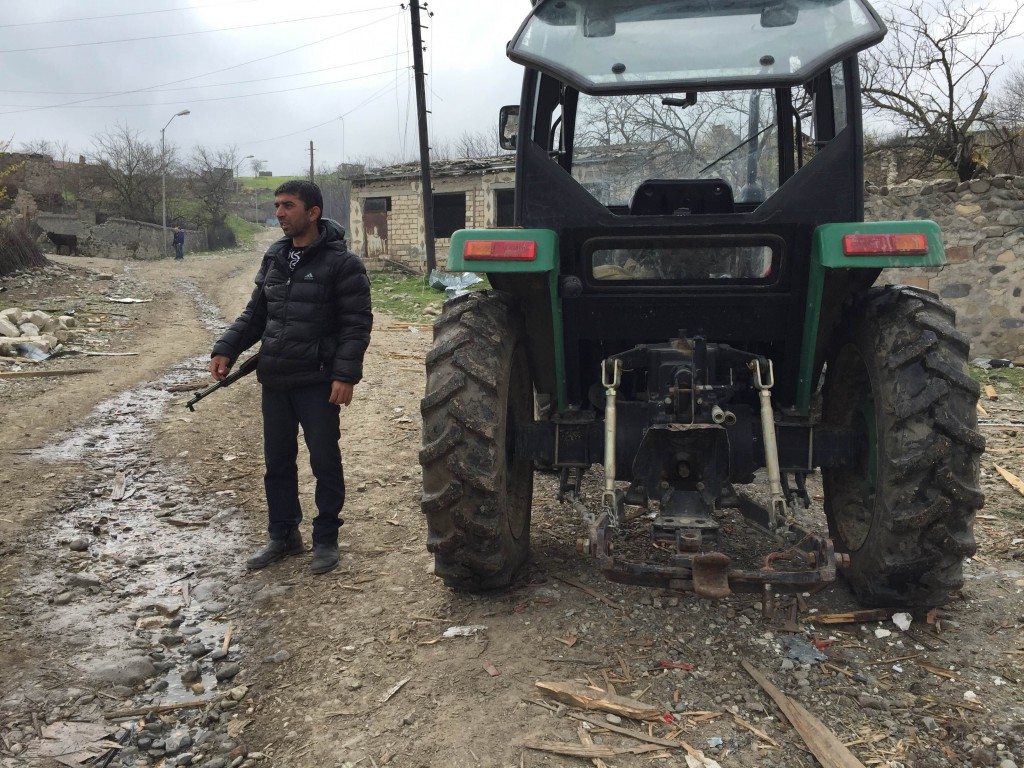
The men of Talish have taken up arms and have joined the NKR Defense Army; some of them are guarding their own village. (Photo: Ani Avetyan/The Armenian Weekly)
R.J.: Why now?
A.K.: Good question. I don’t know if I have a full answer. It’s tricky. As you know, Azerbaijan’s ceasefire violations have increased – quantitatively and qualitatively—since last August; I mean, they’ve been steadily increasing in frequency, in size, and in the hardware used. So, I cannot say that this came out of the blue. They [Azerbaijan] have been getting increasingly bold over time, trying to provoke a response from the Armenian side, probing for weaknesses.
If we want to go further and really figure out “why now?” we must consider the shifting geopolitical alignments in and around the Caucasus: Russia is now preoccupied with many unstable situations along its southern frontier. Whether it’s Ukraine, Turkey, or Syria—the Russians have a lot on their plate; so their roles policeman in this neighborhood might be open to challenge. You have to remember that Turkey has been increasingly bellicose with Russia, and it appears from all indications that it has been aiding and abetting Azerbaijan—giving them courage, skill, and comfort in its efforts. I highly doubt that Azerbaijan would resort to such offensives without such outside support.
There are other theories too. I can’t vouch for them at this stage, but they are interesting to note. Some commentators claim that Azerbaijan really must do its sabre-rattling now, when they still have considerable funds in their state budget. Azerbaijan may not be a wealthy country for much longer: They rely a lot on oil and gas—mainly oil at this stage—and independent studies indicate that a) Baku’s oil supply is running out, and b) it may not be worth much on the international market moving forward. Thus, Azerbaijan’s financial reserves—which it had been using to re-arm—may not be around for much longer. As the theory goes, the time-window may be closing on them, so perhaps there is some urgency on their part to change the playing field now.
R.J.: You mentioned Russia. There have been a number of protests in Yerevan regarding Russia’s sale of arms to Azerbaijan. What can Armenians expect from Russia, also considering their role in the Minsk Group?
A.K.: Those protests are probably justified, viewed from our side. But from Russia’s standpoint, arms sales to Azerbaijan don’t reflect necessarily a pro-Baku position; rather, they are designed to create leverage through dependency. Furthermore, in following recent statements—Russian President [Vladimir] Putin’s televised address two weeks ago and Foreign Minister [Sergei] Lavrov’s press conference last week—I sense that they’re adopting near-zero tolerance to any further hostilities. They are firm and emphatic about the need for a diplomatic, political solution; not a military one. And I don’t think this is diplomatic doubletalk; I think they are serious about it. We need to stay prepared, of course, but I would venture to say it’s unlikely for Azerbaijan to try something on a similar scale in the near future. Not after such statements by Russia. Also, don’t forget that the element of surprise is gone now.
At the same time, we shouldn’t get too excited. On one hand, the Russians mean it when they say they won’t tolerate any interference by Turkey, and won’t accept any escalation of hostility. I think that part is pretty firm and sincere. But then the question arises: What type of diplomatic solution do they seek? In the old days—over the past two decades—Russia’s public stance was to seek a compromise solution. But when negotiations stalled – as they frequently did – they were willing to see a “not war, not peace” situation extend—if not indefinitely, then at least year by year. This is in stark contrast with the West’s—particularly the U.S.’s – stance of seeking a rapid settlement, on terms first and foremost acceptable to Azerbaijan. According to this logic, Russia has been in no hurry to see this problem settled; indeed, a frozen, unresolved status seemed to be in their interest, especially as a way to exercise leverage on each country: Armenia and especially Azerbaijan.
That may be changing now. Some believe that the Russians will try to bring discussions back to the Minsk group and resume the negotiation path already set. Others claim, not without basis, that Russia now seeks to take leadership of this process, as it has become less trusting of the U.S. and other forces. Once again, this comes from Russia’s reaction to others ‘playing around in its backyard.’
Once again, Russia’s back has stiffened. If you read Lavrov’s statement, he was very strongly critical of Turkey, saying that its actions and statements supporting Azerbaijan essentially call for war, not peace. Those were strong, unequivocal statements. Beneath those statements lie an ongoing concern about Baku’s orientation: If Russia feels threatened enough, it could, at this stage, seek to gather both Armenia and Azerbaijan under its umbrella. And in order to gather them effectively, the Russians might seek a more lasting compromise that will leave each side somewhat satisfied and somewhat dissatisfied.
This is among the topics of speculation now… that perhaps Russia is cooking up a more lasting compromise.
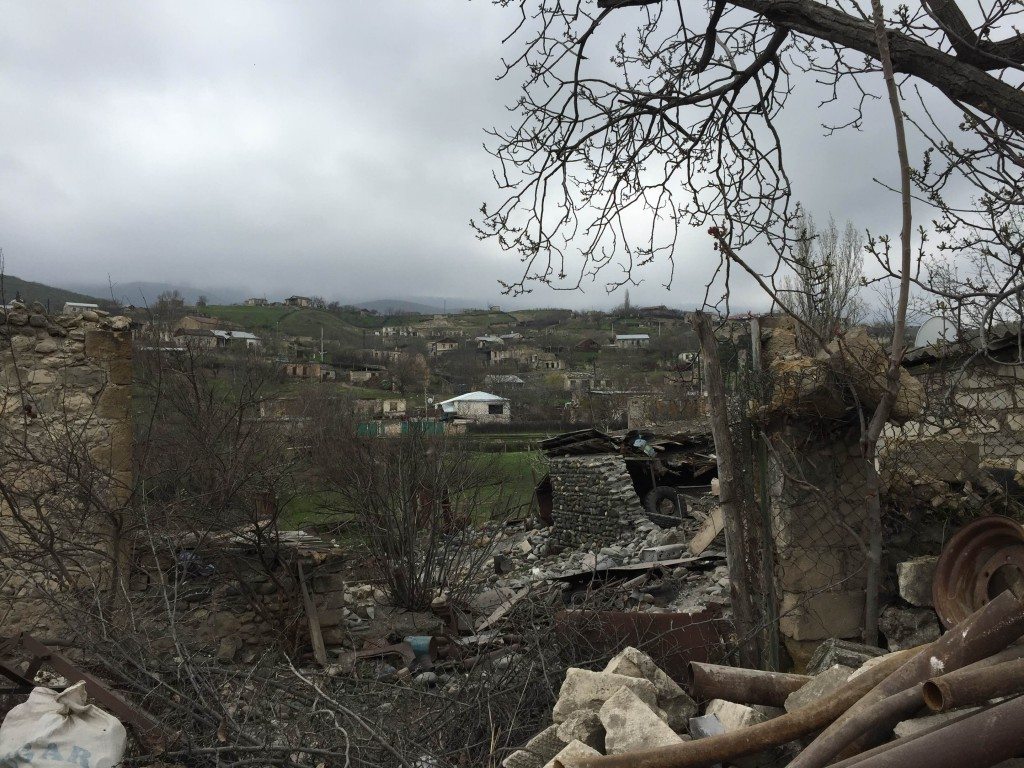
‘If there was any overconfidence on our part, I think that has been erased’ (Photo: Ani Avetyan/The Armenian Weekly, Talish)
R. J.: What sort of compromise may not be acceptable?
A.K.: A difficult question, because there are several dimensions to it. This or that conditionality may be acceptable to Armenia, but not Karabagh. Other conditions may be acceptable to the high politicians, but not to those who are doing the fighting and dying out on the front.
I will say this: The outpouring of support—not only from the Diaspora, but also from Armenia—the hundreds of volunteers that came to the front, and the attitude of the Karabaghtsis themselves, indicate that there is great preparedness to fight and die for this cause. So that is very encouraging for us, and perhaps sobering for Baku… In reading excerpts from their press, I sense their surprise and disappointment that the Armenians’ fighting spirit has not waned during these 22 years.
As far as what’s specifically acceptable or not, there are several theories out there. As we know, the current NKR includes the old, Soviet NKAO [Nagorno-Karabagh Autonomous Oblast], which was basically carved away from Armenia by [leader of the Soviet Union, Joseph] Stalin. The NKR includes the NKAO, but also the liberated territories surrounding the NKAO. In other words, the NKR is a bit larger than the NKAO.
These liberated territories are strategically crucial as security zones: They maintain Azerbaijan’s distance from Karabagh’s main population centers, while creating an integral, territorial bond between Karabagh and Armenia. At the same time, many of these territories have a historically Armenian pedigree. While this isn’t often emphasized, it needs to be: If you go into areas extending from the Lachin corridor, for example, you will find many cultural artifacts – cemeteries, monasteries, ruined villages – that attest to centuries-old presence of Armenians on those lands
Another neglected point is that the NKAO’s territorial form was not solidified until the late 1920s/early 1930s – well after its incorporation according to Soviet law. During the 1920s, much of the intervening territory – today’s Kashatagh – were forcibly depopulated of native Armenians and Kurds, “re-seeded” with Azeris, and then declared part of the NKAO by Azerbaijani decree. This also can and should be challenged through legal arguments.
In sum, there are at least three arguments to keeping the liberated territories. From a security standpoint, it gives the rest of Karabagh some room to breathe and some distance from Azerbaijan’s armed forces. Second, much of this territory is historically Armenian. Third, even according to Soviet norms, the 1988 NKAO boundaries contain gray areas that are debatable. Other arguments are possible as well.
With regard to specific scenarios, let’s recall that Azerbaijan, as a precondition, demands that the Armenian side return all liberated territories, after which we can talk about Karabagh’s political status. Said status would be determined according a referendum by the local population—including the Azerbaijani minority that once lived in Karabagh. Of course Karabagh and Armenia insist that political status must be resolved first, before talking about any territorial concessions.
The OSCE has called for the return of several provinces claimed by Baku – something which Armenia has been willing to consider, but which the NKR firmly rejects. I cannot comment on which territories may be on the block. But one thing everyone agrees on (except for the Azeris!) is that the territories linking Karabagh to Armenia are absolutely vital. For nearly all Armenians, this means Kashatagh (formerly Lachin) and Kelbajar, which together create one integrated unity between Karabagh and Armenia, thereby preventing any encirclement by Azerbaijan. Indeed, not only Armenians but most international policymakers say, pretty clearly, that those two territories have special status. But the OSCE – and especially the U.S. and Turkey—talk about returning some of the other territories, which many Armenians feel are unacceptable giveaways. Indeed, the Karabaghtsis regularly point out that they have lost territories of their own – Shahumian and parts of Martakert and Martuni – that still must be returned. So there is a lot still to be discussed.
R.J.: You recently said that Russia’s intentions have to be more transparent. What has been lacking in this regard?
A.K.: I think that transparency comes in a number of ways. First, Russia has to, in a way, show its cards—demonstrate some sincerity about how it envisions the Caucasus and how it envisions Armenia, Azerbaijan, and Karabagh living together. At times, they’ve talked about coming up with lasting settlements, but frankly, their track record shows otherwise. They’ve been largely comfortable, as I said, with letting this frozen conflict continue.
Putin, in his televised address, actually referred to this. He sort of poked fun at himself and said something along the lines of “I know some people don’t believe me when I say ‘we need a lasting settlement for Karabagh.’” He was referring to those pundits who criticize Russia for not doing enough, or for not being serious about promoting a settlement, instead seeking to use the Karabagh conflict as a leverage point to manipulate Azerbaijan and Armenia.
Russia’s influence over Armenia carries both positive and negative dimensions. On one hand, there are clearly negative trends, both economic (oligarchy, corruption and anti-competitive practices) and political (anti-democratic practices, dampening of civil society growth). These are deplorable trends, partly attributable to Russian influence, and they need to be reversed over time. But from a national security standpoint, Armenia and especially Karabagh will continue to look to Russia as a strong counterbalance to Turkey and Azerbaijan.
Make no mistake, Russia can remain a strong counterbalance, but not for Armenians’ sake. Rather, it has its own sphere of influence to protect: To do so, Russia must make it clear that the southern Caucasus remains an area of great strategic importance for it, and it should make no apologies about this. Of course, I’m not advocating that Armenia become a vassal state of Russia, but there is no question that Russia’s geopolitical interests tend to coincide more with the Karabagh cause than that of any other neighboring power (with the possible exception of Iran).
What does this mean in the near term? While Russia needs to speak a common language through the OSCE Minsk Group, it probably should be more assertive in defining its interests and specifically telling the U.S. that it needs to back off. Because frankly, the U.S. has not been even-handed regarding Karabagh: They have not called a spade a spade, for example, refusing to assign blame when Azerbaijan violates ceasefires repeatedly. Often they simply call for both sides to relax and come back to the negotiation table. Indeed, in recent months, they’ve barely adhered even to that script, giving thinly veiled warnings that Azerbaijan’s aggression will likely continue unless the Armenian side concedes. Now, more than ever, the US is signalling its biases against a fair and lasting settlement. In light of such pressures, the Russians need to be a bit more assertive, as they have become in other hotspots such as Syria.
R.J.: What is your assessment of the OSCE’s response and role in the negotiations? Is the format working?
A.K.: I don’t think the format is all that great, but I don’t see anything better. I don’t think the United Nations (UN) is equipped to handle this matter. Nor do I think Armenia and Azerbaijan can effectively negotiate without outside mediation. Unless Russia is willing to take this on itself—which I’m not sure they’re ready for —the OSCE is probably the least harmful mechanism for creating some kind of consensus.
Now, that’s not saying that the OSCE is flawless; on the contrary, it has many flaws. One is that the OSCE has repeatedly resisted bringing Karabagh into the negotiations. At its core, this is a self-determination struggle; it’s about the people of Karabagh and their wish to live freely. If we accept this premise, then Karabagh has to have a voice and a seat at the table. The OSCE has consistently rejected this, but to be frank, Armenia has not promoted this option consistently. At this stage, could Armenia be more forceful in advocating for this? Yes, I think Armenian could be more forceful.
I understand the idea of Armenia treating Karabagh at arm’s length in diplomatic circles: To this day, Armenia has not formally recognized Karabagh’s independence, fearing that this move would label it as an aggressor, thus tilting the negotiations in Azerbaijan’s favor. On the other hand, Armenia cannot remain a bystander in this diplomatic tussle. For example, [Armenia’s] President [Serge] Sarkisian made a good move a couple of weeks ago, threatening to recognize Karabagh’s independence if hostilities continue.
There are two ways to look at this: If we are going to continue with the current format—working within the OSCE framework— then Armenia needs to either promote Karabagh as a side in the discussions, or say “No, the game is over. Karabagh wants to rejoin Armenia and we’re accepting them and will speak for them.” The first option carries certain advantages; it gives Karabagh voice and some maneuvering room. This is perfectly fine, as Karabagh does not always need to walk in lock-step with Armenia. The second option ups the ante, as it were: It could invite Azerbaijan to declare Armenia the aggressor, thereby justifying hostilities. But at the same time, it puts pressure on Russia to protect both Armenia and Karabagh. More on that in a moment.
R.J.: Do you believe it would be beneficial to do either?
A.K.: I think so. Personally, I believe that bringing Karabagh into the discussions is the way to go. Because there may be times when Armenia, for various reasons, may agree to certain compromises, but Karabagh may not agree. The people on the ground really feel their vulnerability and they may say “not an inch of territory back to the Azeris. We don’t trust them; they’re not fit to govern us.” I think it would be very effective to have that voice heard alongside Armenia’s voice, which, for various reasons, may carry a slightly different message. I think in that in the negotiating environment, that would be a very strong scenario. Of course, the OSCE co-chairs may have different ideas, and even if they agree, Azerbaijan will likely refuse to cooperate.
The other scenario: Armenia incorporating Karabagh—either recognizing its independence or actually accepting it into the Armenian polity—may be more problematic. I think that it can still happen. On the one hand, Armenia openly becomes a side in this conflict. Armenia has repeatedly refrained from that, since they don’t want to invite charges that they are an aggressor. That would obviously change the narrative. But on the plus side, Armenia is a member of CSTO [The Collective Security Treaty Organization]—which is the NATO [North Atlantic Treaty Organization] counterpart in the former Soviet sphere—and according to CSTO agreements, Russia is obliged to assist Armenia if attacked. If Armenia claims or annexes Karabagh, or if Karabagh holds a referendum and joins Armenia—presumably that security arrangement would then extend to Karabagh’s borders.
Of course, there are pluses and minuses on both sides. I view the scenario of bringing Karabagh into the negotiations as more desirable.
R.J.: You were recently in NKR and will be returning there shortly. Can you share your impressions from your last visit?
A.K.: First of all, it’s very encouraging to see the will and determination of the people. The population, even after 20-plus years, is still of a fighting spirit and mind. Many people have not only been conscripted, but have voluntarily gone to the front or lent their services to the war effort. Also, many volunteers have come from Armenia. That is very encouraging.
Could our situation have been handled better, differently? Probably. It appears that Azerbaijan, to some extent, caught us off-guard. I don’t want to say that Karabagh’s defenses were down; but the extent and complexity of the offensive seems to have been more than they expected. Basically, the assault on three fronts simultaneously seems to have stunned Karabagh at the beginning, though the Karabaghtsis recovered quite quickly. I think that the NKR Defense Ministry made the right tactical decision by digging in and taking back most of the lost territory and vantage points—which was not a lot; in certain places maybe a kilometer or two. In taking this decision, the NKR understood that Azerbaijan was seeking a moral and tactical victory, and that such a victory had to be denied. Of course, this cost us many lives; indeed, most lives were lost during the take-back; not during the initial assault.
I should remind that this was also our first real exposure to Azerbaijan’s new weaponry, and I am sure that the Armenian side—both Karabagh and Armenia—will be reacting quickly to this and developing their learning curve, so that nothing like this can happen again.
R.J.: There has been much speculation about the Armenian side not being well-equipped enough during the attacks. Can you comment on that?
A.K.: I don’t have any first-hand evidence to share. There have been reports that at the beginning, our fighters could have been better-equipped. I’m not in a position to confirm or deny them, but those reports should be examined, and I hope that the [NKR] Defense Ministry is taking them seriously. If there are any weaknesses, they have to be shored-up immediately.
In some ways, Azerbaijan has superior offensive weapons; we do know, also, that in many cases we have defensive weapons that are up to the task of repelling such offensives. I think some of it is about weaponry, and some of it is about preparedness. If there was any overconfidence on our part, I think that has been erased; At this point, there is definitely a sober assessment going on within the Armenian and NKR Defense Ministries, so that nothing like this ever happens again.
One thing I should add: Everyone should have understood—and now, I’m sure, everyone does understand—that this is not 1991 or 1994. This is 20-25 years later. In those days, with conventional ground warfare, with some close, even hand-to-hand combat, the Armenians were the clear winners. Even when they were outgunned. Even when they were outmanned. There were a lot of factors that played into this: knowledge of terrain, motivation of fighters, “fighting for hearth and home,” previous military training. There were many comparative advantages that we had. But when you face the situation that we have today—which involves medium- or long-range weaponry—it removes from the game some of those factors that were previously sources of strength.
I’m certain that this is all being re-evaluated—it probably already has been—so that we are up to meeting the challenges. We must understand that Azerbaijan has had time not only to arm itself, but to train with the assistance of Turkey. They have more, better-trained soldiers than they did before.
There are many, many stories from the 1990’s of young Azeri teenagers, college-students forcibly conscripted and sent from Baku to the front lines; parachuted in without knowing what to do, and either quickly taken captive, shot, or deserting and running away. I’m not sure that this holds anymore. While Azeri civilians may have no stomach for fighting, the military is a different matter: You have more and better trained Azerbaijani soldiers now, and I believe Karabagh and Armenia’s Defense Ministries see this very clearly now.
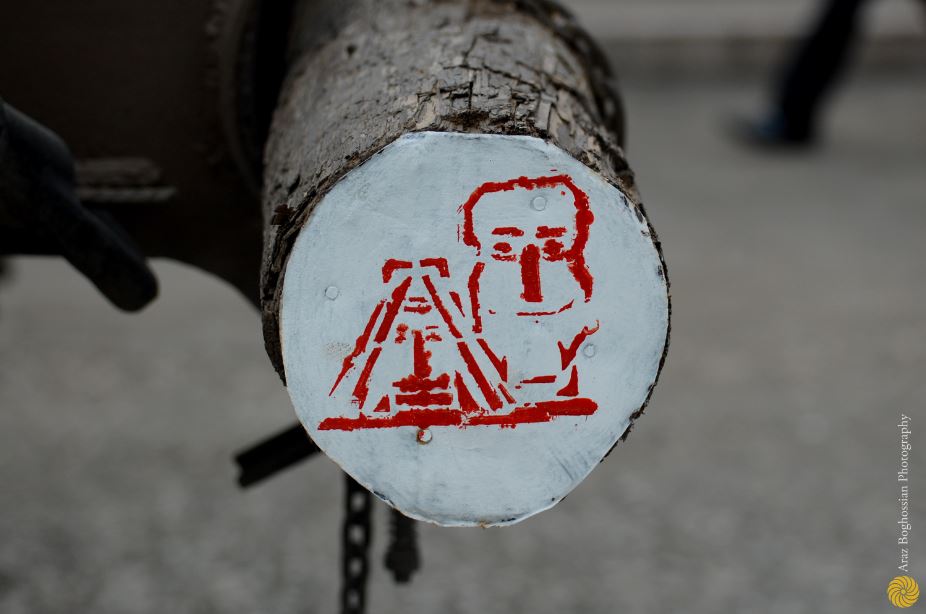
‘[It’s] very encouraging to see the will and determination of the people; the population—even after 20-plus years, is still of a fighting spirit and mind.’ (Photo: Araz Boghossian)
R.J.: You mentioned the Armenian Diaspora earlier. What role can it play in all of this?
A.K.: I think the Diaspora has already played an important role. The solidarity it showed by immediately launching emergency junkets and aid appeals was important in two ways: It provided encouragement and solidarity—which was greatly needed and appreciated locally—and it also provided material support.
Now, I’m not a big fan of short-term emergency aid, except when absolutely necessary. In the long run, directed assistance and developmental aid programs are the way to go. But when you’re in an emergency, you’ve got to do what needs to be done. Thus, for example, the Diaspora has given quite a lot for fallen and wounded soldiers, as well as their families.
As I’ve noted already, large-scale hostilities are less and less likely to re-emerge now. So what to do? As we come out of this emergency phase, as the dust begins to settle, the Diaspora needs to think more clearly about its giving habits. We really must give in an intelligent, far-sighted way, that’s not just knee-jerk giving, in order to feel good that we’re doing something. The giving needs to be a bit more result-oriented; with metrics, with concrete goals and accountability, coordinated with those who live here. Hopefully, very soon, we’ll start to think more strategically about such matters.
Source: Armenian Weekly Mid-West
